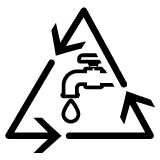Challenges
Population growth and urbanization in developing countries result in a higher demand for water aggravated by spreading low-income areas and informal settlements in urban and peri-urban zones. Water sector institutions and service providers in particular are often not prepared to cope with the rising management and investment challenges. Many public service providers face operational inefficiencies and lack commercial orientation. While access to safe drinking water in sufficient quantity is a human right, the management of the water supply system should be based on commercial principles in order to attain sustainability. This challenge requires the development of appropriate legal and regulatory frameworks, as well as technical, financial and institutional models for target-oriented urban and rural water sector development.
GFA approach and services
 © ©GFA Consulting Group
GFA’s approach to water sector development is geared towards entrepreneurial thinking in the management of economically feasible water supply. Autonomy, transparency and accountability are prerequisites for any successful cooperation and for improved service provision. Commercialization and privatization have to be initiated and enhanced towards this end. GFA’s concepts are tailor-made and emphasize the situationspecific needs of the local population.
© ©GFA Consulting Group
GFA’s approach to water sector development is geared towards entrepreneurial thinking in the management of economically feasible water supply. Autonomy, transparency and accountability are prerequisites for any successful cooperation and for improved service provision. Commercialization and privatization have to be initiated and enhanced towards this end. GFA’s concepts are tailor-made and emphasize the situationspecific needs of the local population.
Management and (re-)organization
Institutional and legal structures and organizational procedures of the water sector need to be optimized for public or private investors and water users alike. Successful pro-poor water sector reforms establish legal and institutional frameworks based on equitable and sustainable access to water supply and sanitation (WSS). GFA assists utilities restructure and implement modern management and operational procedures by up-to-date software packages that increase overall performance.
Financial and commercial operation
Sustainability relies on affordable services and cost recovery. Successful reforms achieve this goal by establishing systems that generate economies of scale, introducing management systems with rising performance levels and implementing cost-covering, pro-poor tariff models. To this end, GFA draws on its own software solutions for accounting, controlling, billing and revenue management. This software, developed by GFA B.I.S., can be adapted to specific project and private sector needs as it offers a tailored, highly flexible concept.
Financing mechanism
Funding in the water sector remains too low and is often not oriented towards pro-poor last mile infrastructure. In addition, last mile infrastructure is often based on poor managerial and technical concepts. Establishing independent financing institutions such as trust funds can be a solution. Such a financing mechanism can obtain funds from government and donors to support the extension and improvement of services to low-income areas. Through transparent competition, funding is provided to water utilities. By means of capacity development and technical and managerial standardization for planning, implementing and operating the facilities, GFA supports trust funds in improving their services to low-income urban areas.
Accompanying measures
As continuous information, education and communication (IEC) are fundamental for overall program success. Hence, GFA specializes in the design and implementation of KAP (knowledge-attitude-practice) surveys and IEC campaigns related to water, hygiene and population. The collection of socio-economic baseline data about the target population, particularly the urban poor, is one of the core competencies of GFA.
Adapted urban water supply concepts
GFA develops adapted water supply concepts for low-income and poor urban areas in cooperation with local operators. The concepts are based on a particular toolkit for planning, designing, implementing, managing, and monitoring water kiosk programs.
Partner of SUSTAINABLE SANITATION ALLIANCE >> www.susana.org
Contact
 Afrim Kalanderi
Afrim Kalanderi
Department Director Water, Sanitation and Waste Management
E-mail: afrim.kalanderi[at]gfa-group.de










